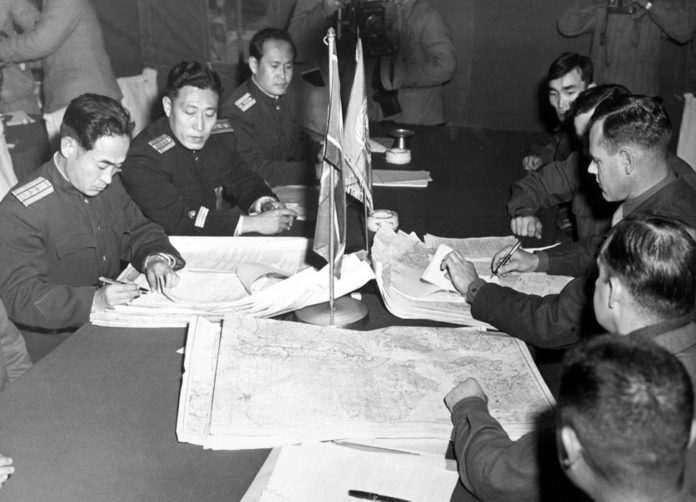This article was originally published by The Hill.
The administration of South Korean President Moon Jae-in is doing everything possible to achieve the goal of getting signatures on a piece of paper affirming that the Korean War is over at last.
The problem with this quest for an end-of-war agreement is that it will only heighten tensions on the Korean Peninsula. The war really did end in July 1953 with the signing of the armistice at Panmunjom, but the truce was never replaced by a peace treaty as envisioned. In a real sense the truce has been a great end-of-war agreement — durable, long lasting and still in place.
It’s easy, of course, for advocates and foes of a treaty to argue that the Korean War is not over. Opposing armies face each other on either side of the Demilitarized Zone established by the truce, the North-South line remains closed to normal commercial traffic, and North Korea threatens foes near and far with nuclear weaponry.
Moon and his ministers and advisers are imploring all sides in the Korean War to sign this piece of paper. North Korea is not going to go along with any such agreement, however, unless the U.S. renounces sanctions imposed as a result of its nuclear and missile tests, and the North is also going to insist on an end to joint military exercises staged by U.S. and South Korean troops.
At the same time, North Korea is not doing away with its nuclear program while developing missiles capable of carrying warheads to targets as close as South Korea and Japan and as far as the U.S. In short, there is absolutely no point in an end-of-war agreement that provides no guarantees of anything while stripping South Korea of essential defenses. Ultimately, North Korea would want a “peace treaty” that calls for dissolution of the United Nations Command and withdrawal of U.S. troops from South Korea.
It’s difficult to know why Moon is so anxious to achieve a deal that obviously will destroy the historic alliance between the U.S. and the Republic of Korea. North Korea would be the sole beneficiary, and it’s easy to imagine the North building up its forces for potential attacks on the South on its way to placing all of Korea under its own dynastic rule, ostensibly communist but really a kingdom dominated by dictator Kim Jong Un.
To read more, please click here.
Donald Kirk has been a journalist for more than 60 years, focusing much of his career on conflict in Asia and the Middle East, including as a correspondent for the Washington Star and Chicago Tribune. He currently is a freelance correspondent covering North and South Korea. He is the author of several books about Asian affairs.


